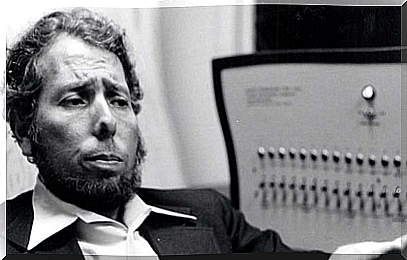5 Quotes From Stanley Milgram

Today, Stanley Milgram is known as one of the most important social psychologists in history. He carried out different works and experiments on obedience. The most famous was published in 1974 and is titled Obedience to Authority . Due to the work of this author and his important research, in this article we will collect some of the most important Stanley Milgram quotes.
In each of Stanley Milgram’s phrases we will discover a good part of his point of view, but also a different perspective on the way people act that invites us to reflect. For example, today we ask ourselves, what is the line that separates obedience from submission? These are questions that are still being addressed in recent articles, such as the Internet, friends and bacteria: the long shadow of Stanley Milgram .
1. The importance of mutual support
This is one of the first phrases of Stanley Milgram that talks about the important weight of the group. This is something that we can affirm based on our own experience, but also because contributions have been made by other scholars in this regard.
Muzafer Sheriff, considered one of the founders of social psychology, worked on the concept of the group and determined a kind of “interdependence”. In Milgram’s case, the group and the support it suggests brings strength and determination to confront the abuses into which authority sometimes falls. A clear criticism, without a doubt.

2. The essentials of obedience
This second of Stanley Milgram’s phrases speaks of a concept that is present in the vast majority of his works: obedience. With this phrase, Milgram tries to make us understand how obedience and submission seem to be the face of the same coin.
When a person obeys – acknowledges an authority – he often becomes the instrument (puppet) of another person – the authority. In many cases it is not a conscious process, but what occurs is a transfer of responsibility; It is frequent that people under the influence of an authority end up depositing in this part, or even all, the responsibility for their actions.
In some way, it is as if the person ceases to be who he is to abandon himself to the wishes and whims of those who order him. However, Milgram points out how “a person sees himself as an instrument”, which does not mean that he is.
3. Taking action is necessary
With this third sentence, Stanley Milgram refers to his interest in demonstrating the gears of social behavior through studies and experiments. This author, who called himself an “experimentalist”: defended that it is the tests, the errors and the successes, which can best answer the questions that were asked regarding the behavior of people.
This reminds us of Aristotle. A great philosopher of classical Greece who already in his time introduced what was known as science or experimental research. A way to check facts and reach the most accurate conclusions possible.
4. The evasion of the mandates of others
This is another of Stanley Milgram’s phrases with which he affirms that a system of authority is, if not indispensable, a characteristic for living in community. Following a series of rules seems to be the way to establish a certain order. But who can escape this?
Milgram points out with his phrase that only a person who lives in isolation can escape, in some way, the norms that govern any community. Being outside of it, it is not obliged to respond or submit to anyone’s command. This may also remind us of the movie Into the Wild .

5. Be the middle link
In this last of the Stanley Milgram phrases that we have collected. The author talks about the concept of an intermediate link in a chain of action. It is easy to close your eyes to the final consequences of actions that are carried out when they do not directly affect the person in this position.
For example, someone who works in a large company, but is not aware that the viability of the company depends on the performance of its workers, may end up harming their own working conditions or even losing their jobs.
What do you think of these Stanley Milgram quotes? Which of them has caught your attention the most? We hope that some of them have allowed you to reflect on the concept of obedience, one of the terms that is present in the vast majority of the works and studies of this author.









